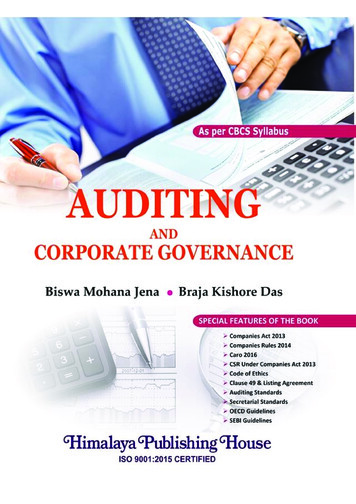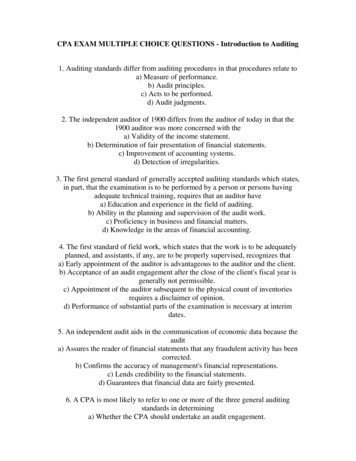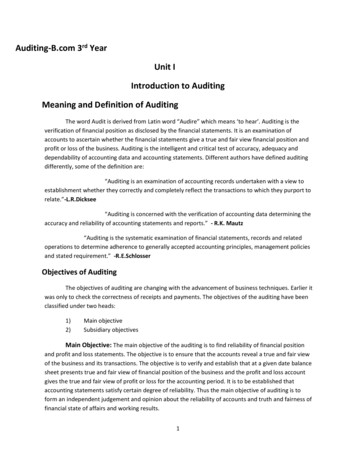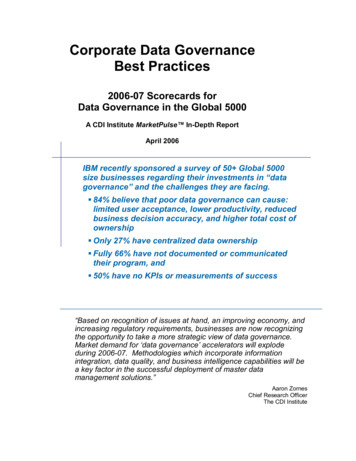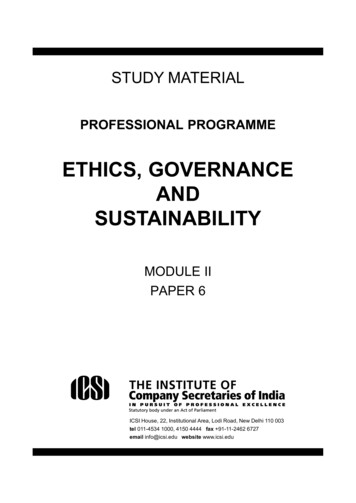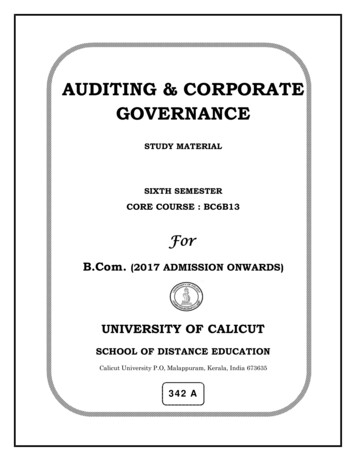
Transcription
AUDITING & CORPORATEGOVERNANCESTUDY MATERIALSIXTH SEMESTERCORE COURSE : BC6B13ForB.Com. (2017 ADMISSION ONWARDS)UNIVERSITY OF CALICUTSCHOOL OF DISTANCE EDUCATIONCalicut University P.O, Malappuram, Kerala, India 673635342 A
School of Distance EducationUNIVERSITY OF CALICUTSCHOOL OF DISTANCE EDUCATIONSTUDY MATERIALSIXTH SEMESTERB.Com.(2017 ADMISSION ONWARDS)CORE COURSE : BC6B13AUDITING AND CORPORATE GOVERNANCEPrepared by:Rajan P,Assistant Professor of Commerce,School of Distance Education,University of Calicut.Auditing and Corporate GovernancePage 2
School of Distance EducationCONTENTSModulePage No.Module 14 - 29Module 230 – 68Module 369 – 80Module 481 – 92Module 593 - 106Auditing and Corporate GovernancePage 3
School of Distance EducationMODULE 1MEANING AND DEFINITION OF AUDITINGThe word audit is derived from Latin word audire which means ‘to hear’. Auditing is acritical examination of the records and books of account of a business by an independent qualifiedperson for ascertaining the authenticity and the accuracy of entries appearing in the books ofaccount and financial statement. Spicer and Pegler have defined audit as “ such an examinationof the books, accounts and vouchers of a business as will enable the auditor to satisfy himself thatthe Balance Sheet is properly drawn up, so as to give a true and fair view of the state of affairs ofthe business and whether the profit and loss account gives a true and fair view of the profit or lossfor the financial period, according to the best of his information and explanation given to him andis shown by the books and if not in what respect he is not satisfied.” Montgomery defined auditingas examination of the books and records of a business in order to ascertain or verify and report upon the facts regarding the financial operations and the results thereof.”ORIGIN AND EVOLUTIONThe term audit is derived from the Latin word ‘audire’, which means to hear. In early daysan auditor used to listen to the accounts read over by an accountant in order to check them.Auditing is as old as accounting. It was in use in all ancient countries such as Mesopotamia,Greece, Egypt, Rome, U.K. and India. The Vedas contain reference to accounts and auditing.Arthasashthra by Kautilya had emphasized the importance of accounting and auditing. The originalobjective of auditing was to detect and prevent errors and frauds. Auditing evolved and grewrapidly after the industrial revolution in the 18th century with the growth of the joint stockcompanies the ownership and management became separate. The shareholders who were theowners needed a report from an independent expert on the accounts of the company managed bythe board of directors who were the employees. The objective of audit shifted and audit wasexpected to ascertain whether the accounts were true and fair rather than detection of errors andfrauds. In India, the companies Act 1913 made audit of company accounts compulsory with theincrease in the size of the companies and the volume of transactions. The main objective of auditshifted to ascertaining whether the accounts were true and fair rather than true and correct. Hencethe emphasis was not on arithmetical accuracy but on a fair representation of the financial efforts.Auditing and Corporate GovernancePage 4
School of Distance EducationThe companies Act 1913 also prescribed for the first time the qualification of auditors. TheInternational Accounting Standards Committee and the Accounting Standard board of the Instituteof Chartered Accountants of India have developed standard accounting and auditing practices toguide the accountants and auditors in the day to day work. The later developments in auditingpertain to the use of computers in accounting and auditing. In conclusion it can be said thatauditing has come a long way from hearing of accounts to taking the help of computers to examinecomputerized accounts.Objectives of AuditingThe objective of an audit may be classified as(1) Primary Objective(2) Subsidiary Objective(3) Specific ObjectivePrimary Objective or Main Objective: Expression of expert opinion: - The main objective of auditing is to verify the accounts and recordsand to report to the owners of the business whether the profit and loss account and the Balancesheet have been properly drawn up according to the requirements of law, and whether they exhibita true and fair view of the profit and the financial position of the business. To ensure that theprimary objective of audit is achieved, an auditor must:(a) Examine the Internal Control and Internal Check.(b) Verify whether all the books of accounts as required by law are kept.(c) Verify whether proper accounting principles and procedures are followed.(d) Check the arithmetical accuracy of the books of accounts.(e) Verify the authenticity and validity of the transactions.(f) Confirm the existence and the values of the assets and liabilities by physical verification.(g) Find out whether the financial statement is properly drawn up.(h) Report whether the profit and loss gives a true and fair view of the profit or loss for the yearand Balance sheet gives a true and fair view of the financial position of the business at the end ofthe financial year. Subsidiary or Ancillary objectives: - Subsidiary objectives of auditing are(1) Detection and prevention of errors.(2) Detection and prevention of frauds.Auditing and Corporate GovernancePage 5
School of Distance EducationDetection and prevention of Errors: - Errors refer to unintentional misstatements in the recordsor books. Errors are two types namely (1) Clerical or technical errors and (2) Errors of principle.Clerical Errors: - Clerical errors refer to all types of errors committed on account of clericalmistakes. They are (a) Errors of omission (2) Errors of Commission (3) Compensating errors and(4) Errors of duplication. Errors of Omission: - An error of omission is one which arises when atransaction has been omitted to be recorded in the books of accounts either wholly or partially. Anerror of omission may be an error of complete omission or an error of partial omission. An errorof complete omission does not affect the agreement of the trial balance, as both the aspects of thetransaction are omitted from the trial balance, they cannot be detected easily. They can be detectedonly by an intensive checking of the subsidiary books, and the postings from the subsidiary booksto the ledger. On the other hand, an error of partial omission affects the agreements of the trialbalance, as only one of the aspects of the transactions is omitted from the trial balance, it can bedetected easily.Errors of Commission: - Errors of commission refer to errors committed in the process of postingfrom the subsidiary books to the ledger accounts, casting, carry forward and balancing of ledgeraccounts. Some of the errors of commission will not affect the agreement of the trial balance. Theycannot be detected easily. Only a thorough checking of the subsidiary books and posting to theledger can help to detect these errors.Compensating errors: - When the effect of one error is counter balanced, set off or compensatedby another error, the errors are known as compensating errors or offsetting errors. Compensatingerrors do not affect the agreement of the trial balance, as they are counter balanced or set off.Errors of Duplication: - Errors of duplication arise when an entry in a book of original entry hasbeen made twice and also been posted twice.Errors of Principle: - An error of principle arises when the generally accepted principles ofaccountancy are not observed, while recording a transaction in the books of account. In otherwords, if a transaction is recorded in the books of account against the generally accepted principlesof accountancy, the error is known as an error of principle. Capital expenditure recorded as revenueexpenditure or vice versa, capital receipt recorded as revenue receipt or vice versa is examples oferrors of principle. Errors of principle will not affect the agreement of the trial balance. Only adetailed and intensive checking will reveal these errors.Auditing and Corporate GovernancePage 6
School of Distance EducationDetection and prevention of frauds: - It is intentional or willful representation or deliberateconcealment of material fact with a view to deceive, cheat or mislead somebody. Fraud may bebroadly classified into three types. They are(1) Misappropriation of cash(2) Misappropriation of goods(3) Manipulation of accountsMisappropriation, Defalcation or Embezzlement of Cash: - Misappropriation of cash means thefraudulent appropriation of cash belonging to another person by whom it has been entrusted.Misappropriation of cash may take place in any of the following ways:(a) Suppression or non disclosure of Cash receipts :The following are examples of suppression of cash receipts:(1) By misappropriating the receipt by not recording the same in the Cashbook.(2) By entering lesser amount on the counterfoil and misappropriatingThe difference between money actually-received and the amount entered on the counterfoil of thereceipt book(3) By not recording the receipt of sale of a casual nature for example Sale of scrap, sale of oldnewspapers etc.(4) By omitting to record cash donations received by non-profit making charitable institutions(5) By misappropriating the cash received on discounting the bills Receivable and showing themas bills outstanding on hand.(6) By misappropriating cash received from debtors and concealing the same by giving artificialcredit to the debtors in the form of bad debts, Discount or sales return etc.(7) By adopting the method of "teeming and lading" or "lapping process". This is one of themethods of misappropriation of cash. Under this method cash received from the first customer ismisappropriated by the cashier. The money received from the second customer is credited to theaccount of the first customer, the money received from the third customer is credited to the accountof second customer, and the money received from the fourth customer is credited to the accountof third customer and so on. This process is carried out throughout the year.(8) By suppressing the cash sales by not recording them or by treating the cash sales as credit sales.(9) By misappropriating the sale proceeds of VPP sales or sales of Goods on approval basis bytreating the transaction as goods Received or not approved.Auditing and Corporate GovernancePage 7
School of Distance Education(10) By under casting receipt side total of the cashbook.(b) Inflating the payments or showing false cash payments: - The following are examples of thistype of misappropriation:(1) Recording fictitious or false cash purchases and pocketing the amount.(2) Inflating the cash purchases and pocketing the difference.(3) Recording payments to fictitious creditors for purchases and pocketing the money.(4) Recording the payment to creditors at a figure higher than the actual amount and pocketing thedifference.(5) Recording payments to dummy workers and pocketing the money.(6) Recording fictitious payments of expenses and pocketing the money.(7) Recording payments of some accounts at figures higher than the actual payments and pocketingthe difference.(8) By showing credit purchases as cash purchases and misappropriating the amount(9) Recording personal expenses as business expensesMANIPULATION OF ACCOUNTSManipulation of accounts means falsification of accounts without any misappropriation ofcash or goods. It implies presentation of accounts more favorably than what they actually are.Manipulation of accounts may be done in any of the following ways:(1) Non provision of depreciation on fixed assets.(2) Provision of less depreciation on fixed assets(3) Provision of more depreciation on fixed assets(4) Over valuation of assets(9) Showing short term liabilities as long term liabilities.(10) Recording sales of the next year in the current year’s revenue account.Specific objectivesThere will be specific objective in respect of each type of specific audits. For example, inoperational audit, the aim of audit is to evaluate the existing operations of the entity in order togive expert advice to improve their efficiency. The cost audit is to check the cost records of theentity in order to make a report on the proper ascertainment of cost of production of goods orservices. Depending upon the nature of specific audit, there may be different objective in respectof each specific audit.Auditing and Corporate GovernancePage 8
School of Distance EducationPROCEDURE TO BE FOLLOWED TO DETECT ERRORSFollowing procedures may be adopted by the auditor to detect the errors.1. Check the opening balances from the balance sheet of the last year.2. Check the posting into respective ledger accounts3. Check the total of the subsidiary books.4. Verify all the castings and the carry forwards.5. Ensure that the list of debtors and creditors tally with the ledger accounts.6. Make sure that all accounts from the ledger are taken into accounts.7. Verify the total of the trial balance.8. Compare the various items from the trial balance with that of the previous year.9. Find out the amount of difference and see whether an item of half or such amount is enteredwrongly.10. Check differences involving round figures as Rs. 1,000; Rs. 100 etc.11. See where there is misplacement or transposition of figures that is 45 for 54; or 81 for 18 etc.12. Ultimately careful scrutiny is the only remedy for detection of errors.THE AUDITOR’s Position and duty in regard to detection and prevention of errors andfrauds1. Examine all aspects of the finance.2. Vouch all the receipts from the counterfoils or carbon copies or cash Memos, sales martreports etc.3. Check thoroughly the salary and wages register.4. Verify the methods of valuation of stocks.5. Check up stock register, goods inwards notes, goods out wardsbooks and delivery challansetc6. Calculate various ratios in order to detect fraudulent manipulation of accounts7. Go through the details of unusual items8. Probe into the details of the problems when there is a suspicion.9. Exercise reasonable skill and care while performing the duty.10. Make surprise visit to check the accounts.Auditing and Corporate GovernancePage 9
School of Distance EducationAn auditor’s position and duty in relation to detection and prevention of errors and frauds hadbeen beautifully explained in the case of Kingston Cotton Mill Company. In this case it wasremarked, “An auditor is a watch dog and not a blood hound”. The remark an auditor is a watchdog limits the audit examination to mere verification of accounts but does not cover detection oferrors and frauds. But an effort to detect errors and frauds and suggest ways and means to preventthe errors and frauds in the future. Verification of accounts also implies vigilance on the part ofthe auditor to detect errors and frauds. As such while verifying the books of accounts, if an auditorsmells some irregularities he must follow them. He should act honestly and takes reasonable skilland care in detecting errors and frauds. In India, the duty of an auditor has to detect errors andfrauds have also been emphasized by the Council of Chartered Accountants. According to thiscouncil, an auditor should bear in mind the possibility the existence of fraud or other irregularities,because the financial position may be misstated as a result of errors and frauds. It is true that anauditor has to detect errors and frauds. But while performing his task of detection of errors andfrauds, he need not be a blood hound. He is not required to take to task those staff that has beenfound guilty of committing errors and frauds. This view was upheld in the case of London OilStorage Company Ltd VS Seears Hasluck and Company. In this case it was held an auditor is notbound to assume when he comes to do his duty that he is dealing with fraudulent and dishonestpeople. If circumstances of suspicions arise, it is his duty to probe them to bottom. To sum up,an auditor is not an insurer against errors and frauds. That he does not guarantee that the booksdo not contain any errors and frauds. However, he has always to be very careful about errors andfrauds. He must exercise reasonable care and skill in the detection of errors and frauds. Once hesuspects the existence of errors and frauds, he must go in to the roots and unearth them. In short,an auditor is not just a watch dog. But, at the same time, he need not be blood hound.ADVANTAGES OF AUDIT: Audit offers several advantages. They are:1. Advantages of Audit to the business enterprise and Management(1) Audit ensures the accuracy or correctness of the books of accounts(2) Audit ensures the authenticity and reliability of the financial statements.(3) Audit helps in the detection and rectification of errors and frauds.(4) Audit helps the enterprise and management to ascertain whether the legal requirements arecomplied with.Auditing and Corporate GovernancePage 10
School of Distance Education(5) Audit point out the weakness of the existing system of internal check and internal control.(6) Audit examination makes the employees in charge of accounts and records vigilant, regularand up- to –date in their work.(7) Loans and credit facilities can be easily obtained by a concern on the basis of audited accounts.(8) Liability of an enterprise as to income tax, wealth tax, and value added tax etc can be easilydetermined on the basis of audited accounts.(9) A business can enjoy better reputation, if its accounts are audited by an independentprofessional auditor.(10) Audited accounts are more reliable as evidence in courts of law.(11) Facilitates calculation of purchase consideration.(12) The insurance claim can be easily determined on the basis of audited accounts.(13) Audited accounts serve as a basis for solving the disputes as to higher wages.(14) Comparison of accounts from year to year becomes easier since the accounts are uniformlyprepared.2. Advantages of audit to the owners of the business:(1) In the case of a sole trader, auditing assures him that all business transactions have been dulyaccounted for and there are no errors or frauds. It also helps him to know the true facts about thebusiness.(2) In the case of partnership firm, audited accounts serve as an evidence of proper managementof the affairs of the business. Audited accounts are help in the valuation of goodwill and settlementof accounts on the admission, retirement or death of a partner. Again audited accounts minimizethe chances of disputes among the partners.(3) In the case of a joint stock company, audit of accounts assures the shareholders that the affairsof their company are smoothly and their investment is safe. The shareholders of a company canvalue their shares on the basis of audited accounts.(4) In the case of a co – 0p society or a trust, audit assures the members or the beneficiaries thatthe affairs of the society or trust are conducted properly and their investment are looked afterproperly.3. Advantages of Auditing to others:(1) Lenders can depend on audited financial statements while taking a decision to grant credit tothe business concern.Auditing and Corporate GovernancePage 11
School of Distance Education(2) Tax authorities can depend on audited statements in assessing sales tax, income tax and wealthtax of the business.(3) Audit of accounts safeguards the interests of the workers and is helpful in the settlement ofclaim for higher wages and bonus.(5) Insurance company can rely on audited accounts to settle claims in respect of damage or lossof any business asset by fire, theft etc.(6) The purchaser of a business can easily calculate the amount of purchase consideration on thebasis of audited accounts.(7) Audited accounts create confidence in the minds of investors in a joint stock company.Limitations of Auditing: Generally following are the Limitations of auditing1. Non-detection of errors or frauds: - Auditor may not be able to detect certain frauds whichare committed by the clients.2. Dependence on explanation by others: - Auditor has to depend on the explanation andinformation given by the responsible officers of the company. Audit report is affected adversely ifthe explanation and information prove to be false.3. Dependence on opinions of others:- Auditor has to rely on the views or opinions given bydifferent experts viz Lawyers, Solicitors, Engineers, Architects etc, he cannot be an expert in allthe fields4. Conflict with others: - Auditor may have differences of opinion with the accountants,management, engineers etc. In such a case personal judgement plays an important role. It differsfrom person to person.5. Effect of inflation : - Financial statements may not disclose true picture even after audit due toinflationary trends.6. Corrupt practices to influence the auditors: - The management may use corrupt practices toinfluence the auditors and get a favourable report about the state of affairs of the organisation.7. No assurance: - Auditor cannot give any assurance about future profitability and prospects ofthe company.8. Inherent limitations of the financial statements: - Financial statements do not reflect currentvalues of the assets and liabilities. Many items are based on personal judgement of the owners.Auditing and Corporate GovernancePage 12
School of Distance EducationCertain non-monetary facts cannot be measured. Audited statements due to these limitationscannot exhibit true position.9. Detailed checking not possible: - Auditor cannot check each and every transaction. He may berequired to do test checking.10. Auditing is a post mortem examination of accounts.AUDITING Vs INVESTIGATION:Investigation is an enquiry into the accounts and records of a business concern for a specialpurpose, say, to know the actual financial position of the concern or to know the real earningcapacity of the business or to know the extent of fraud, if any. There are many differences betweenthe two. They are:Points of1. ObjectsDifferenceThe object is to find out whetherbalance sheet and profit and lossaccount exhibit a true and fair view ofbusiness.2. PeriodIt usually covers one accountingyear.3. ConductedIt is conducted for proprietors only.4.ScopeIt is restricted to balance sheetand profit and loss account.5. CompulsionAudit is legally compulsory forcompanies.6. TimeIt may be conducted at the end ofthe year.7. ReportForm of report is prescribed. It ispresented to the shareholders.8. AppointmentOwners appoint the auditors.9. QualificationsThe statutory auditors mustpossess proper qualifications.Auditing InvestigationIt is undertaken to knowthe essential facts about amatter under inquiry. It isdone with some specialpurpose of view.It may cover more than oneaccounting year.It is carried out on behalfof any party interested inthe matter.It is wider in scope. It maybe carried out beyondbalance sheet.It is voluntary. It isrequired under certaincircumstances.It may be conducted at anytime in case of suspicionabout any transaction.Form of report is notprescribed. It is presentedto the client.Even third party can appointan investigator.Even an employee preferablya chartered accountant may beappointed as investigator.10. reworkAuditing and Corporate GovernancePage 13
School of Distance EducationRe - audit is not generally undertaken.Re - investigation maybe undertaken.DISTINCTION BETWEEN ACCOUNTING AND AUDITINGPoint of difference1. MeaningAccountingIt is recording of all the dayto day transactions in thebooks of accounts leadingto preparation of financialstatements.It is concerned withfinalization of accounts.AuditingIt is the critical examination ofthe transactions recorded in thebooks of accounts.3. ObjectsThe object is to ascertainthe trading results.The object is to certify thecorrectness of financialstatements.4. CommencementAccounting Commenceswhen book keeping ends.Auditing begins whenAccounting ends.5. ScopeIt involves various financialstatements. It involvesmaintenance of books ofaccounts.An accountant is not requiredto submit any report to theproprietor of the business.It depends upon the agreementor upon the provisions of law. Itgoes beyond books of accounts.7. periodAccountancy work isconducted continuouslythroughout the year.Auditing work is generally,conducted at the end of theyear or periodically.8. QualificationAn accountant, who is incharge of accounting work,need not be a qualifiedperson.An accountant is an insiderie an employee of theundertaking.An accountant being anemployee of the concern ispaid regular salary for hiswork.An auditor, who is incharge of auditing work,must be a qualified person.An auditor is an outsider,not an employee of theundertaking.2. Nature6. Report9. Position10. RemunerationAuditing and Corporate GovernanceIt is concerned withestablishment of reliability offinancial statements.An auditor is required tosubmit a report to theproprietor of the business.An auditor is paid fixed feefor his work.Page 14
School of Distance EducationQualification and Qualities of an AuditorTo be an efficient auditor, an auditor must possess certain professional qualifications andprofessional and personal qualities.Professional qualification: - An auditor is a professional accountant. So he must possess certainprofessional qualifications. Under the Companies Act, an auditor of a joint stock Company mustbe a Chartered accountant within the meaning of the Chartered Accountants Act of 1949. To be aChartered accountant, he must pass the C.A examination conducted by the Institute of CharteredAccountants. He must also obtain a certificate from the institute from the Institute of CharteredAccountants to take up public practice of accountancy.Professional Qualities: - To perform his work efficiently, an auditor must possess certainprofessional qualities. They are:1. Knowledge of principles and practice of general accounting.2. Knowledge of Cost accounting3. Knowledge of Management accounting4. Thorough knowledge of techniques of auditing5. Knowledge of provisions relating to income tax, wealth tax, VAT etc.6. Knowledge of business laws.7. Knowledge of economics.8. Knowledge of Mathematics and Statistics9. Knowledge of Business Management and Organization and financial administration10. Knowledge of report writing.11. Knowledge of technical details of the business under audit.12. Knowledge of the accounts of the business under audit.Personal Qualities or General Qualities: - Besides the professional qualities, an auditor mustalso have certain personal or general qualities to perform his work efficiently and smoothly. Therequisite personal qualities are :(i) Honesty and Integrity.(ii) Tactfulness(iii) Vigilance(iv) An enquiry mind(v) MethodicalAuditing and Corporate GovernancePage 15
School of Distance Education(vi) Care and Skill(vii) Diligence(viii) Judgement.(ix) Responsibility(x) Impartiality and independence.(xi) Common sense(xii) Ability to communicate(xiii) Ability to work hard(xiv) Patience(xv) Courtesy(xvi) Ability to maintain secrets.Classification of audit or types of auditAudit can be classified on different types:( 1) Classification of Audit on the basis of Organization structure.( 2)Classification of audit on the basis of Degree of independence of the auditor( 3) Classification of Audit on the basis of method or approach to audit work or on the basis ofextent of work to be performed or on the basis of conduct of audit.(4) Classification of audit on the basis specific objectivesClassification on the basis of organization or organization structure : - On the basis oforganization structure, audit may be classified into three types.They are:( 1)Statutory audit( 2) Government audit( 3) Private AuditStatutory Audit: - Statutory audit refers to the audit of accounts of a business enterprises carriedout compulsorily under the provisions of a statute or law. It is is the audit carried out compulsorilyunder any statute any law.Features of statutory audit are:1. Statutory audit is compulsory under law.2. Statutory audit is required to be conducted by a qualified auditor.Auditing and Corporate GovernancePage 16
School of Distance Education3. In the case of Statutory audit, the rights, duties and liabilities of the auditor are governed by thestatute or law applicable to the undertaking.4. Statutory audit is an independent audit.5. Statutory audit is an external audit.6. Statutory audit must be a complete or full audit. It cannot be partial. Statutory audit is carriedout in a number of Organizations, such as1. Joint stock Companies governed by the Companies Act of 1956.2. Banking companies governed by the Banking Regulation Act of 1949.3. Insurance companies governed by the Insurance Act of 1938.4. Electricity supply companies governed by the electricity supply Act of 1948.5. Co – operative societies registered under the Co –operative Societies Act.6. Public and charitable trusts registered under Religious and Endowment Acts2. Government audit: - Government audit refers to the audit of accounts of Governmentdepartments and offices, Government companies and statutory or public corporations.The features of government audit are1. Government audit is prescribed for by law.2. It is conducted either by the comptroller and Auditor General of India and his staff orprofessional chartered accountant approved by the Comptroller and Auditor General of India.3. It is internal audit.4. A government audit is a continuous audit.Objectives of Government audit1. To ensure that all payment has been sanctioned by the competent authority.2. To ensure that every payments is made as per the rules and regulations.3. To see that the payments have been made to the right persons.4. To ensure that the expenditure is not excessive.5. To see that payments are properly classified as capital and revenue.6. To verify the existence of stocks and stores.7. To ensure that a proper system of stock
pertain to the use of computers in accounting and auditing. In conclusion it can be said that auditing has come a long way from hearing of accounts to taking the help of computers to examine computerized accounts. Objectives of Auditing The objective of an audit may be classified as (1 ) P rimary Objective (2 ) S ubsidiary Objective
